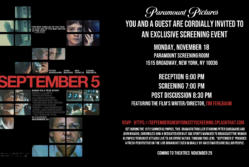Archive Event Highlight

International Press Clubs Sign Media Freedom Declaration in London
by Patricia Kranz
Members of the International Association of Press Clubs (IAPC) and the European Federation of Press Clubs held a joint meeting in London in late October, the first in-person gathering of the two organizations since 2019.
The meeting was hosted by the London Press Club. Nineteen delegates from press clubs in Berlin, Brussels, Jerusalem, New York, Vienna, Warsaw, Australia, France and India participated. The OPC, which is a member of the IAPC, was represented by Patricia Kranz, OPC executive director.
The meeting started with a speech from Doug Wills, chairman of the London Press Club and editor emeritus of the Evening Standard and culminated in the signing of the “London Declaration on Media Freedom” in London’s Guildhall. Jaroslaw Wlodarczyk of the Press Club Polska signed on behalf of the IAPC, Isabelle Bourdet of the Press Club de France represented the European Federation, and Doug Wills represented the London Press Club.
The declaration’s purpose is “to put on record our support for media freedom in a world increasingly hostile to the exercise of free and fair journalism.” It calls on press clubs to monitor progress in maintaining and expanding global media freedom and report each year on the state of media freedom in their own countries.
Read and download a PDF of the declaration here.
Wlodarczyk spoke on behalf of the Kyiv Press Club, whose representative was unable to get a visa to travel to London. The Press Club Polska has been providing workspace and other support to the Kyiv Press Club and Press Club Belarus. Wlodarczyk said that the European Union has provided 15 million euros for Ukrainian journalists, but that most of the funds will go to Ukrainian state media. He noted that independent journalists in Ukraine desperately need help. He thanked the OPC for its program to give grants to independent Ukrainian journalists (OPC judges are reviewing grant applications and the club will distribute $36,000 of grants after the judges have made their decisions). Delegates discussed the possibility of using the OPC grant program as a model for other press clubs to help Ukrainian journalists, or for the creation of an IAPC fund to help journalists in crisis around the world.
Anton Ruliou of the Press Club Belarus joined the meeting on a video call from Warsaw. He reported that independent journalists from Belarus have two options: jail or exile. “Almost all independent Belarussian journalists operate from abroad,” he said. Press Club Belarus, using space in the Press Club Polska, provides online courses such as psychological safety and language training to their fellow expatriates. They reach audiences in Belarus via the internet. The government blocks the websites of independent media, but some news gets through on social media. But users have to be careful when sending links or liking posts from independent media because the government may accuse them of participating in the activity of an “extremist organization” and send them to jail.
Before the war in Ukraine, many Belarusian media organizations used the Yandex search engine and portal to reach their audiences and bypass blocks. This is no longer an option, and the majority of Belarusian internet users use Google. According to Ruliou, because of Belarusian state blocking, Google algorithms push down the posts of independent Belarusian media websites and automatically promote available or otherwise permitted websites, primarily controlled by Russia, which disseminate hostile state propaganda, manipulative narratives, hate speech and disinformation. “Consequently, due to the work of their algorithms, the largest internet platforms have become de facto distributors of Russian state propaganda,” he said. Ruliou asked other press clubs for help in explaining this situation to Google.
During the three-day program, delegates were invited to attend the London Press Club’s awards luncheon and a session at the Frontline Club with local journalists discussing UK politics and sports. Martyn Bond of the London Press Club organized the events.
Former Reuters correspondent Brian Mooney, now a deputy in the City of London government, addressed the group following the signing of the media freedom declaration. In a conversation with me, he noted that he won a Hal Boyle Award citation in 1981 from the OPC for his coverage of the Solidarity crisis in Poland.






